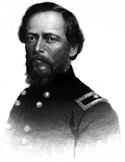Manassas Junction, March 18, 1862.
Lieutenant J. M. Favill, A. A. A. General,
Sir: On the 14th instant, about 9:30 A. M., this regiment marched with a brigade of cavalry, all under the command of Brigadier-General George Stoneman, via the Orange and Alexandria railroad to Cedar Run. The march was rendered somewhat tedious and difficult by having nothing better than the ruins of burnt bridges upon which to cross, at Broad and Kettle runs.
At 6:30 P.M., we arrived at a point about a mile and a half east of Cedar Run, where the enemy had driven back a small force of the Sixth cavalry. General Stoneman, here ordered me to send two companies to drive in their pickets. I ordered out Company A, Captain Chapman, on the south side of the road, and H., Captain Horner, on the north, under the command of Major Parisen. Advancing as skirmishers, they drove the enemy before them in the dark to the west end of the run. Here a portion of Captain Chapman’s company, becoming exposed by the light of some burning cars on the road, received a few shots from the enemy, which were promptly returned, but with what effect is not known, further than that the enemy retreated beyond the hills.
About midnight Lieutenant Reid, of Company F, with twenty men, returned to the regiment. He had been sent forward with Lieutenant Brower, from the vicinity of Bristoe Station, in the morning. He reported having seen the enemy’s scouts, at a distance, several times during the day. In the morning General Stoneman ordered the whole regiment forward to Catlett’s Station. Two Companies, B, and I, under Throop and Lieutenant Mott, being deployed in advance as skirmishers, continued their march to the run. Shortly after Major Parisen was sent to asume command of them; they had arrived but a short time, when small parties of the enemy appeared on the opposite bank.
The orders of the general prohibited firing except in reply to fire, but little time, however, was lost in consequence, for they soon commenced firing upon both companies. Their fire was promptly returned, two or three of their saddles being emptied. The general’s object having been accomplished, the regiment retired, the skirmishers were drawn in as a rear guard, and the whole command marched to camp. The return march was severe on account of incessant rain and bad condition of the roads. The difficulty in recrossing Broad and Kettle Runs was increased by the rapid rise of the water. At the former the ruins were swept away whilst two men yet remained to cross. There was no alternative but to leave them behind, but both have since come in.
Very respectfully, your obedient servant,
S. K. Zook,
Colonel Commanding Fifty-seventh N. Y.



